Herbert Wells - A Short History of the World
Здесь есть возможность читать онлайн «Herbert Wells - A Short History of the World» весь текст электронной книги совершенно бесплатно (целиком полную версию без сокращений). В некоторых случаях можно слушать аудио, скачать через торрент в формате fb2 и присутствует краткое содержание. Год выпуска: 2011, Жанр: История, на английском языке. Описание произведения, (предисловие) а так же отзывы посетителей доступны на портале библиотеки ЛибКат.
- Название:A Short History of the World
- Автор:
- Жанр:
- Год:2011
- ISBN:нет данных
- Рейтинг книги:4 / 5. Голосов: 1
-
Избранное:Добавить в избранное
- Отзывы:
-
Ваша оценка:
- 80
- 1
- 2
- 3
- 4
- 5
A Short History of the World: краткое содержание, описание и аннотация
Предлагаем к чтению аннотацию, описание, краткое содержание или предисловие (зависит от того, что написал сам автор книги «A Short History of the World»). Если вы не нашли необходимую информацию о книге — напишите в комментариях, мы постараемся отыскать её.
A Short History of the World — читать онлайн бесплатно полную книгу (весь текст) целиком
Ниже представлен текст книги, разбитый по страницам. Система сохранения места последней прочитанной страницы, позволяет с удобством читать онлайн бесплатно книгу «A Short History of the World», без необходимости каждый раз заново искать на чём Вы остановились. Поставьте закладку, и сможете в любой момент перейти на страницу, на которой закончили чтение.
Интервал:
Закладка:
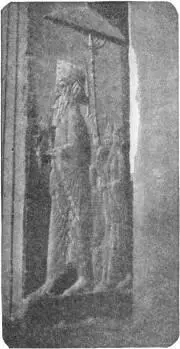
PERSIAN MONARCH
From the ruins of Persepolis
Photo: Miss F. Biggs
Thus it was the Babylonian and Median empires were united. Cambyses, the son of Cyrus, subjugated Egypt. Cambyses went mad and was accidentally killed, and was presently succeeded by Darius the Mede, Darius I, the son of Hystaspes, one of the chief councillors of Cyrus.
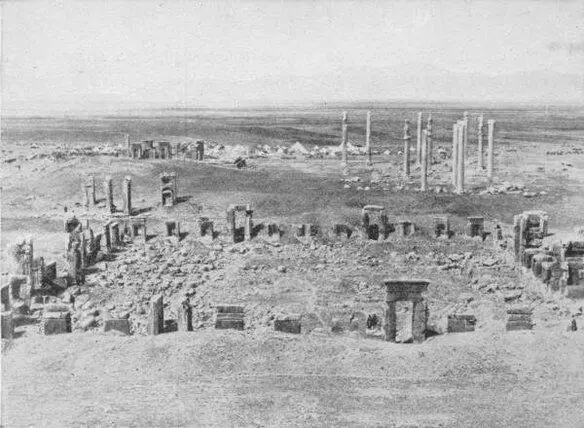
THE RUINS OF PERSEPOLIS
The capital city of the Persian Empire; burnt by Alexander the Great
Photo: Major W. F. P. Rodd
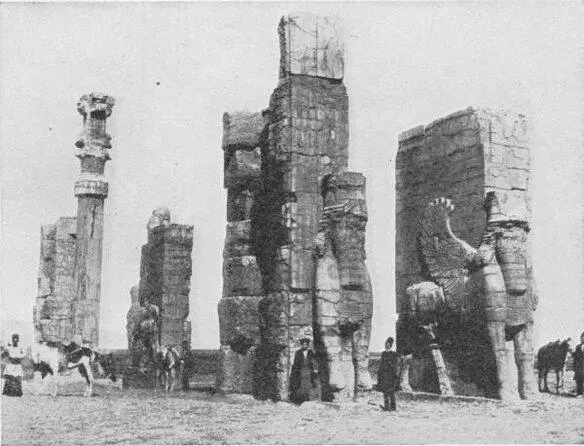
THE GREAT PORCH OF XERXES, AT PERSEPOLIS
Photo: Major W. F. P. Rodd
The Persian Empire of Darius I, the first of the new Aryan empires in the seat of the old civilizations, was the greatest empire the world had hitherto seen. It included all Asia Minor and Syria, all the old Assyrian and Babylonian empires, Egypt, the Caucasus and Caspian regions, Media, Persia, and it extended into India as far as the Indus. Such an empire was possible because the horse and rider and the chariot and the made-road had now been brought into the world. Hitherto the ass and ox and the camel for desert use had afforded the swiftest method of transport. Great arterial roads were made by the Persian rulers to hold their new empire, and post horses were always in waiting for the imperial messenger or the traveller with an official permit. Moreover the world was now beginning to use coined money, which greatly facilitated trade and intercourse. But the capital of this vast empire was no longer Babylon. In the long run the priesthood of Bel Marduk gained nothing by their treason. Babylon though still important was now a declining city, and the great cities of the new empire were Persepolis and Susa and Ecbatana. The capital was Susa. Nineveh was already abandoned and sinking into ruins.
XXI
THE EARLY HISTORY OF THE JEWS
AND now we can tell of the Hebrews, a Semitic people, not so important in their own time as in their influence upon the later history of the world. They were settled in Judea long before 1000 B.C., and their capital city after that time was Jerusalem. Their story is interwoven with that of the great empires on either side of them, Egypt to the south and the changing empires of Syria, Assyria and Babylon to the north. Their country was an inevitable high road between these latter powers and Egypt.
Their importance in the world is due to the fact that they produced a written literature, a world history, a collection of laws, chronicles, psalms, books of wisdom, poetry and fiction and political utterances which became at last what Christians know as the Old Testament, the Hebrew Bible. This literature appears in history in the fourth or fifth century B.C.
Probably this literature was first put together in Babylon. We have already told how the Pharaoh, Necho II, invaded the Assyrian Empire while Assyria was fighting for life against Medes, Persians and Chaldeans. Josiah King of Judah opposed him, and was defeated and slain at Megiddo (608 B.C.). Judah became a tributary to Egypt, and when Nebuchadnezzar the Great, the new Chaldean king in Babylon, rolled back Necho into Egypt, he attempted to manage Judah by setting up puppet kings in Jerusalem. The experiment failed, the people massacred his Babylonian officials, and he then determined to break up this little state altogether, which had long been playing off Egypt against the northern empire. Jerusalem was sacked and burnt, and the remnant of the people was carried off captive to Babylon.
There they remained until Cyrus took Babylon (538 B.C.). He then collected them together and sent them back to resettle their country and rebuild the walls and temple of Jerusalem.
Before that time the Jews do not seem to have been a very civilized or united people. Probably only a very few of them could read or write. In their own history one never hears of the early books of the Bible being read; the first mention of a book is in the time of Josiah. The Babylonian captivity civilized them and consolidated them. They returned aware of their own literature, an acutely self-conscious and political people.
Their Bible at that time seems to have consisted only of the Pentateuch, that is to say the first five books of the Old Testament as we know it. In addition, as separate books they already had many of the other books that have since been incorporated with the Pentateuch into the present Hebrew Bible, Chronicles, the Psalms and Proverbs for example.
The accounts of the Creation of the World, of Adam and Eve and of the Flood, with which the Bible begins, run closely parallel with similar Babylonian legends; they seem to have been part of the common beliefs of all the Semitic peoples. So too the stories of Moses and of Samson have Sumerian and Babylonian parallels. But with the story of Abraham and onward begins something more special to the Jewish race.
Abraham may have lived as early as the days of Hammurabi in Babylon. He was a patriarchal Semitic nomad. To the book of Genesis the reader must go for the story of his wanderings and for the stories of his sons and grandchildren and how they became captive in the Land of Egypt. He travelled through Canaan, and the God of Abraham, says the Bible story, promised this smiling land of prosperous cities to him and to his children.
And after a long sojourn in Egypt and after fifty years of wandering in the wilderness under the leadership of Moses, the children of Abraham, grown now to a host of twelve tribes, invaded the land of Canaan from the Arabian deserts to the East. They may have done this somewhen between 1600 B.C. and 1300 B.C.; there are no Egyptian records of Moses nor of Canaan at this time to help out the story. But at any rate they did not succeed in conquering any more than the hilly backgrounds of the promised land. The coast was now in the hands, not of the Canaanites but of newcomers, those Ægean peoples, the Philistines; and their cities, Gaza, Gath, Ashdod, Ascalon and Joppa successfully withstood the Hebrew attack. For many generations the children of Abraham remained an obscure people of the hilly back country engaged in incessant bickerings with the Philistines and with the kindred tribes about them, the Moabites, the Midianites and so forth. The reader will find in the book of Judges a record of their struggles and disasters during this period. For very largely it is a record of disasters and failures frankly told.
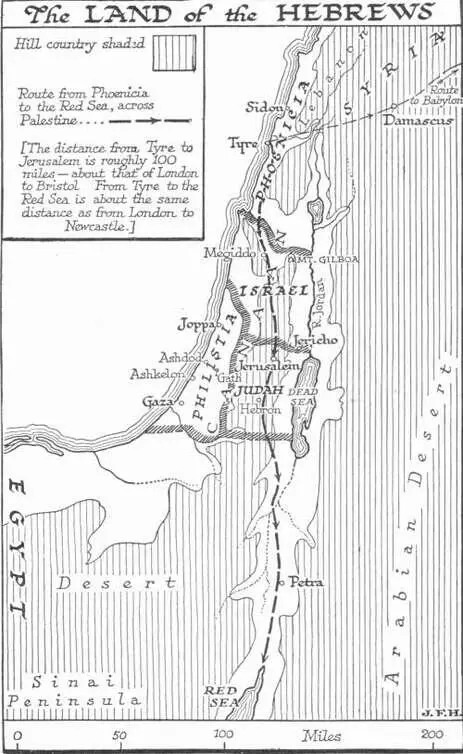
For most of this period the Hebrews were ruled, so far as there was any rule among them, by priestly judges selected by the elders of the people, but at last somewhen towards 1000 B.C. they chose themselves a king, Saul, to lead them in battle. But Saul’s leading was no great improvement upon the leading of the Judges; he perished under the hail of Philistine arrows at the battle of Mount Gilboa, his armour went into the temple of the Philistine Venus, and his body was nailed to the walls of Beth-shan.
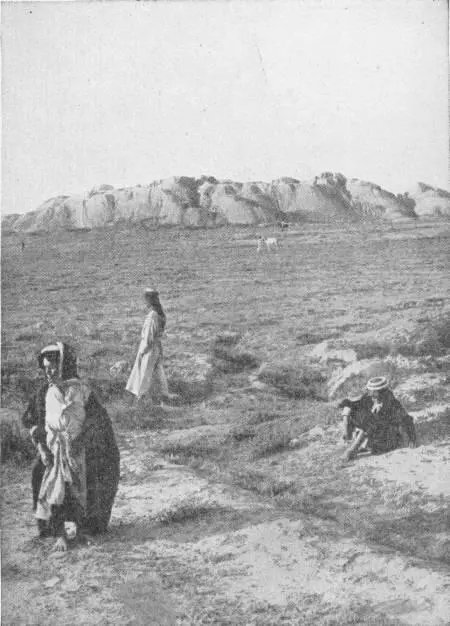
Интервал:
Закладка:
Похожие книги на «A Short History of the World»
Представляем Вашему вниманию похожие книги на «A Short History of the World» списком для выбора. Мы отобрали схожую по названию и смыслу литературу в надежде предоставить читателям больше вариантов отыскать новые, интересные, ещё непрочитанные произведения.
Обсуждение, отзывы о книге «A Short History of the World» и просто собственные мнения читателей. Оставьте ваши комментарии, напишите, что Вы думаете о произведении, его смысле или главных героях. Укажите что конкретно понравилось, а что нет, и почему Вы так считаете.








